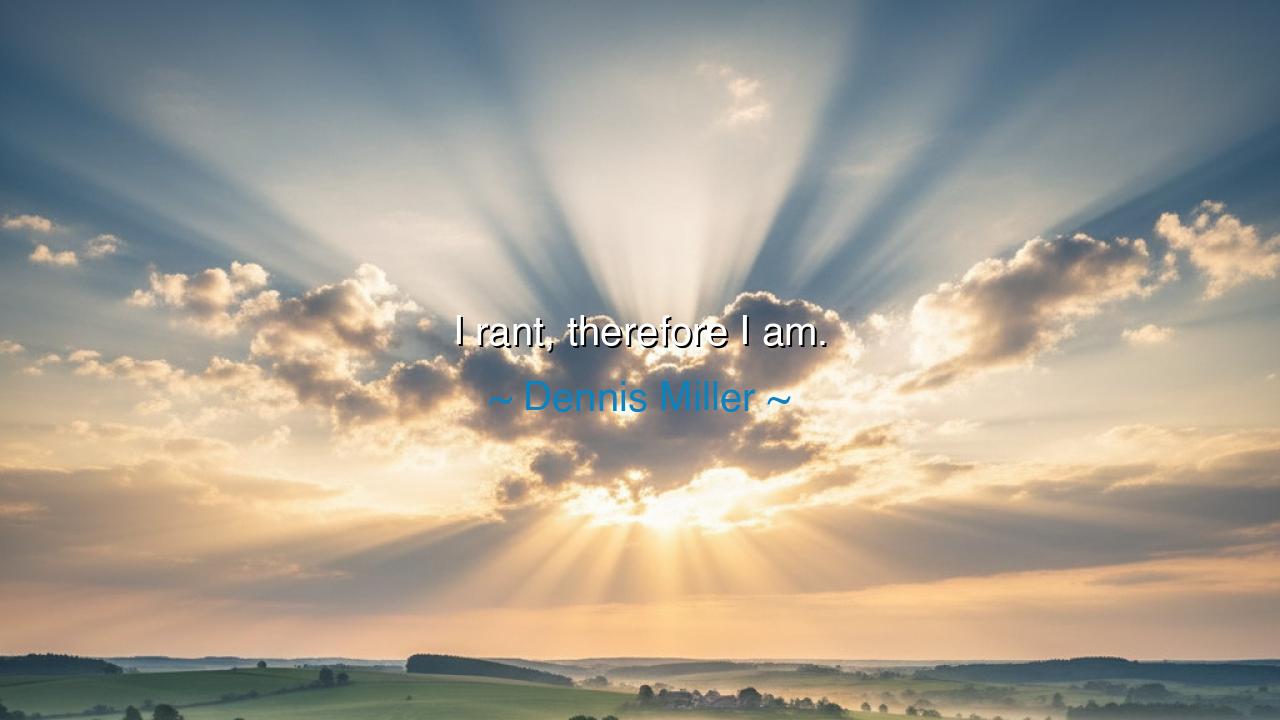
I rant, therefore I am.






“I rant, therefore I am.” — in this sharp and irreverent declaration, Dennis Miller, the American comedian and social commentator, reshapes the immortal philosophy of Descartes — “I think, therefore I am.” Yet, through humor and wit, he exposes a truth deeply relevant to the modern soul: that in an age of noise, conflict, and frustration, it is through our expression, our protest, our passionate speech — our ranting — that we reaffirm our sense of self. Beneath the comedy lies something profound: the recognition that to speak one’s mind, even in anger or satire, is to assert one’s existence amid chaos.
Where Descartes sought certainty through thought, Miller finds authenticity through voice. The philosopher sat in stillness, doubting the world until only the thinker remained; Miller, in contrast, stands before the whirlwind of absurdity and declares his being through the act of ranting — the cry of the conscious against the dullness of conformity. His humor masks a rebellion: the refusal to remain silent while the world drifts into madness. The rant becomes his philosophy, his way of being, his proof that he is alive, aware, and unafraid to challenge what others accept.
The origin of this thought lies in the tradition of the satirist, a lineage that reaches back to the ancients — to Aristophanes mocking the politics of Athens, to Juvenal exposing the corruption of Rome. Through laughter and outrage, these figures did what philosophers could not: they shook the sleeping mind awake. They ranted not for noise, but for truth — wielding words like torches to expose hypocrisy, injustice, and folly. Miller stands in their company, a modern heir to the art of intelligent defiance, proving that comedy, too, can be a weapon of wisdom.
Consider the example of Diogenes of Sinope, the cynic philosopher who carried a lantern through the streets of Athens, declaring he sought “an honest man.” His entire life was a living rant — against luxury, pretense, and societal blindness. Though his tone was scathing and his manner outrageous, his purpose was pure: to awaken moral clarity through provocation. In the same way, Miller’s declaration, though comic, echoes Diogenes’ spirit. To rant, when done with reason and heart, is to bear witness — to speak out when others choose the comfort of silence.
Yet there is danger in the rant, too. It can become bitterness, noise without light. Miller’s wit carries power because it is anchored in awareness — his anger refined by intellect, his criticism shaped by conscience. The ancients taught that righteous indignation is holy, but untempered wrath is self-destruction. Thus, the wise must learn the art of balance: to speak fiercely, but not blindly; to protest, but not poison; to channel outrage into illumination. The truest rant is not chaos, but clarity spoken in passion’s tone.
In a world where many have forgotten how to feel, the act of ranting — of speaking truth with heat — is an affirmation of vitality. It is the cry of the individual refusing to dissolve into apathy. When Miller says, “I rant, therefore I am,” he is not celebrating anger, but presence — the presence of mind that refuses to drift through life unthinking. To rant, for him, is to participate in the great dialogue of humanity, to wrestle with meaning, to reject numbness. The one who rants still cares, still feels, still believes that words can move the world.
The lesson, then, is not to fear passion, but to refine it. In times of confusion, do not fall into silent resignation. Speak — but speak with thought. Criticize — but do so with the aim to build, not destroy. Your voice, when guided by truth, becomes the pulse of your existence. Let your “rant” not be the noise of frustration, but the music of conviction.
So remember, O seeker of wisdom — to speak is to live. When truth burns within you, let it be heard, but let it be shaped by love of clarity, not hatred of chaos. For in every age, there must be those who dare to rant, not as jesters of bitterness, but as keepers of conscience. As Dennis Miller teaches in his biting irony, laughter and passion are the twin proofs of a soul still awake — and in the end, it is far better to rant and be alive than to whisper and be forgotten.






AAdministratorAdministrator
Welcome, honored guests. Please leave a comment, we will respond soon